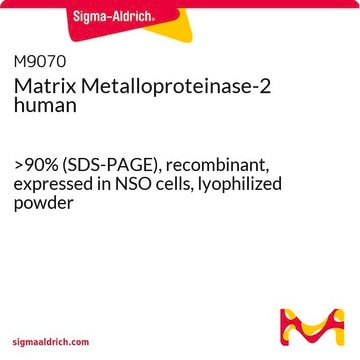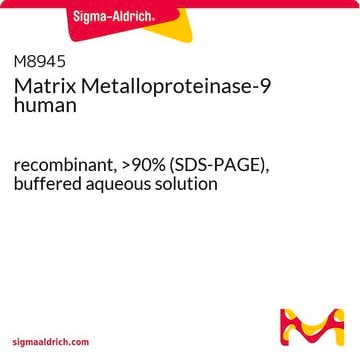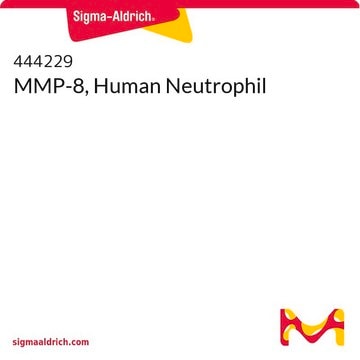SAE0077
MMP-9 human
recombinant, ≥1,300 pmol/min/μg, expressed in HEK 293 cells
Synonyme(s) :
GELBCLG4B, Gelatinase, Gelatinase B, MANDP2, MMP-9, Matrix Metalloproteinase-9, Type IV collagenase
About This Item
Produits recommandés
Source biologique
human
Niveau de qualité
Produit recombinant
expressed in HEK 293 cells
Pureté
95% (SDS-PAGE)
Forme
liquid
Poids mol.
calculated mol wt 76 kDa
observed mol wt 92 kDa (The protein migrates as a 92 kDa protein on SDS-PAGE due to glycosylation)
Concentration
50-200 μg/mL
Numéro d'accès UniProt
Application(s)
cell analysis
Conditions d'expédition
dry ice
Température de stockage
−20°C
Informations sur le gène
human ... MMP(4318)
Description générale
Actions biochimiques/physiologiques
MMP-9 is secreted from neutrophils, macrophages, and a number of transformed cells, and is the most complex family member in terms of domain structure and regulation of its activity.
Structurally, MMP9 maybe be divided into five distinct domains: a pro-domain which is cleaved upon activation, a gelatin binding domain consisting of three contiguous fibronectin type II units, a catalytic domain containing the zinc binding site, a proline rich linker region, and a carboxyl terminal hemopexin like domain.
Autres remarques
Forme physique
Code de la classe de stockage
12 - Non Combustible Liquids
Classe de danger pour l'eau (WGK)
WGK 1
Point d'éclair (°F)
Not applicable
Point d'éclair (°C)
Not applicable
Certificats d'analyse (COA)
Recherchez un Certificats d'analyse (COA) en saisissant le numéro de lot du produit. Les numéros de lot figurent sur l'étiquette du produit après les mots "Lot" ou "Batch".
Déjà en possession de ce produit ?
Retrouvez la documentation relative aux produits que vous avez récemment achetés dans la Bibliothèque de documents.
Les clients ont également consulté
Notre équipe de scientifiques dispose d'une expérience dans tous les secteurs de la recherche, notamment en sciences de la vie, science des matériaux, synthèse chimique, chromatographie, analyse et dans de nombreux autres domaines..
Contacter notre Service technique










